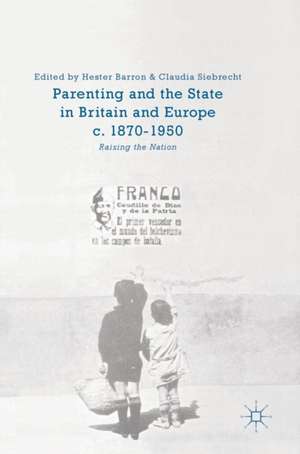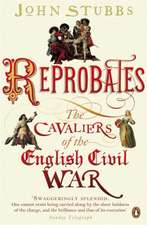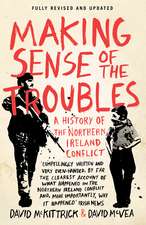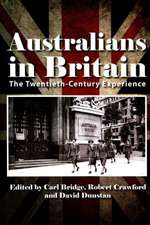Parenting and the State in Britain and Europe, c. 1870-1950: Raising the Nation
Editat de Hester Barron, Claudia Siebrechten Limba Engleză Hardback – 6 ian 2017
| Toate formatele și edițiile | Preț | Express |
|---|---|---|
| Paperback (1) | 632.85 lei 6-8 săpt. | |
| Springer International Publishing – 12 iul 2018 | 632.85 lei 6-8 săpt. | |
| Hardback (1) | 637.25 lei 6-8 săpt. | |
| Springer International Publishing – 6 ian 2017 | 637.25 lei 6-8 săpt. |
Preț: 637.25 lei
Preț vechi: 749.70 lei
-15% Nou
Puncte Express: 956
Preț estimativ în valută:
121.94€ • 127.57$ • 101.29£
121.94€ • 127.57$ • 101.29£
Carte tipărită la comandă
Livrare economică 03-17 aprilie
Preluare comenzi: 021 569.72.76
Specificații
ISBN-13: 9783319340838
ISBN-10: 3319340832
Pagini: 316
Ilustrații: XV, 287 p.
Dimensiuni: 148 x 210 x 2 mm
Greutate: 0.49 kg
Ediția:1st ed. 2017
Editura: Springer International Publishing
Colecția Palgrave Macmillan
Locul publicării:Cham, Switzerland
ISBN-10: 3319340832
Pagini: 316
Ilustrații: XV, 287 p.
Dimensiuni: 148 x 210 x 2 mm
Greutate: 0.49 kg
Ediția:1st ed. 2017
Editura: Springer International Publishing
Colecția Palgrave Macmillan
Locul publicării:Cham, Switzerland
Cuprins
1. Hester Barron and Claudia Siebrecht, Introduction: Raising the Nation.- 2. Siȃn Pooley, Parenthood, Citizenship and the State in England, c. 1870-1914.- 3. Katja Haustein, The ‘Breastfeeding Crisis’: Parenting, Welfare Policies, and Ideology in Imperial Germany, 1871-1914.- 4. Daniel J. R. Grey, Parenting, Infanticide, and the State in England and Wales, 1870-1950.- 5.Sarah-Anne Buckley, Parenting, Poverty and the NSPCC in Ireland: 1889–1939.- 6.Claudia Siebrecht, ‘I looked after the State, but the State is not Looking after Me’. Parenting and the Population Crisis in First World War Germany.- 7. Hester Barron, Parents, Teachers and Children’s Well-Being in London, 1918-1939.- 8. Kaisa Vehkalahti, Notions of Parenting and the Home in the Institutional Care of Delinquent Girls in Finland, 1920s-1940s.- 9. Kate Ferris, Parents, Children and the Fascist State: the Production andReception of Children’s Magazines in 1930s’ Italy.- 10. Suan Sheridan Breakwell, ‘Knowing how to be a Mother’: Parenting, Emotion and Evacuation Propaganda during the Spanish Civil War, 1936-39.- 11. Olga Kucherenko, In Loco Parentis: Junior Cadet Schools as an Instrument of State Parenting in the Soviet Union during the Second World War.- 12. Jelena Batinić, Motherhood and the Yugoslav Communist State in the Revolutionary Era, 1943-1953.
Notă biografică
Hester Barron is a Senior Lecturer in History at the University of Sussex, and is especially interested in the themes of identity, community, childhood, parenting and schooling. Her previous publications include The 1926 Miners' Lockout: Meanings of Community in the Durham Coalfield (2009).
Claudia Siebrecht is a Senior Lecturer in History at the University of Sussex, with interests in the cultural history of war and violence in 20th century Germany and Europe. Her previous work includes The Aesthetics of Loss: German Women’s Art of the First World War (2013).
Claudia Siebrecht is a Senior Lecturer in History at the University of Sussex, with interests in the cultural history of war and violence in 20th century Germany and Europe. Her previous work includes The Aesthetics of Loss: German Women’s Art of the First World War (2013).
Textul de pe ultima copertă
This innovative collection draws on original research to explore the dynamic interactions between parents, governments and their representatives across a range of European contexts; from democratic Britain and Finland, to Stalinist Russia and Fascist Italy. The editors pay close attention to the various relationships and dynamics between parents and the state, showing that the different parties were defined not solely by coercion or manipulation, but also by collaboration and negotiation. Parents were not passive recipients of government direction: rituals and cultures of parenting could both affirm and undermine state politics. Readers will find this collection crucial to understanding family life and the role of the state during a period when both underwent significant change.
Caracteristici
Crucial to understanding family life and the role of the state during the 20th century Helps readers to comprehend the relationship between parents/caregivers and government authorities Uses original research to explore a multitude of different cases and situations, providing an international perspective upon a seldom examined subject











